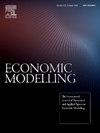Market-based climate policy with fluctuating fossil energy prices
IF 4.2
2区 经济学
Q1 ECONOMICS
引用次数: 0
Abstract
Since market-based climate policies such as carbon pricing affect the cost of using fossil resources, rule-based climate policy adjustments in response to fossil energy price shocks may promote macroeconomic stabilization. This raises the question of whether climate policy should adapt to short-term fluctuations in fossil energy prices. We examine this question by employing a dynamic stochastic general equilibrium (DSGE) model calibrated for the German economy. Our results indicate that the macroeconomic and welfare impacts of rule-based carbon pricing adjustments depend on the share of recycled revenue. If revenue is fully absorbed, lowering emissions prices can stabilize the economy in response to rising energy prices. Conversely, if revenue is at least partially recycled, maintaining a stable carbon price will improve overall welfare. With a stable carbon price, revenue recycling acts as insurance against fluctuating energy prices. This result remains robust across several robustness checks.
求助全文
约1分钟内获得全文
求助全文
来源期刊

Economic Modelling
ECONOMICS-
CiteScore
8.00
自引率
10.60%
发文量
295
期刊介绍:
Economic Modelling fills a major gap in the economics literature, providing a single source of both theoretical and applied papers on economic modelling. The journal prime objective is to provide an international review of the state-of-the-art in economic modelling. Economic Modelling publishes the complete versions of many large-scale models of industrially advanced economies which have been developed for policy analysis. Examples are the Bank of England Model and the US Federal Reserve Board Model which had hitherto been unpublished. As individual models are revised and updated, the journal publishes subsequent papers dealing with these revisions, so keeping its readers as up to date as possible.
 求助内容:
求助内容: 应助结果提醒方式:
应助结果提醒方式:


